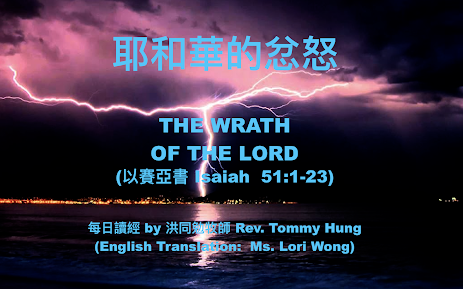求主使我曉得你怒氣的權勢,按你該受的敬畏曉得你的忿怒.
Lord! Let me comprehend the power of your anger and your wrath, according to the fear that is your due.
耶和華的忿怒
THE WRATH OF THE LORD
經文: 以賽亞書 Isaiah 51:1-23
釋義: 本章可以分為三段。每段都提及「安慰」的主旨(3,12,19), 但以第二段(12~16)為核心。這段與前後的經文在格式和用字上, 有很大的分別。這段的主詞(subject)是「我」, 其他經文卻是「你們/你」。第一段(1~11)和最後一段(17~23)都要求以色列人「要聽」神的話(1,4,7,21), 並且以「興起! 興起!」勸勉人奮勇面對逆境。
Insight: This chapter can be divided into 3 sections. All 3 sections share the same central idea of ‘comfort’ (3, 12, 19), with the second section as the core. The format and diction of this section are very different from those of the preceding and succeeding passage; the subject is ‘I’ whereas it is ‘you (plural)/you (singular)’ elsewhere in the chapter. In both the first and last section, there is a plea for the Israelites to “listen” to God’s word (1, 4, 7, 21), along with uplifting words of encouragement “Wake yourself! Wake yourself!” to exhort the people to face adversity courageously.
- 不要怕, 因耶和華是神 (12~16) — 以賽亞用他在本書重複強調的創造主題, 指證惟有耶和華是神(12)。但是耶和華不單只是權能的神,更重要的是祂保持與人的特別關係: 「我是耶和華你的耶和華……你是我的百姓」(15~16)。因著這種關係, 耶和華提醒子民: 「惟有我,是安慰你們的。你是誰,竟怕那必死的人?怕那要變如草的世人?卻忘記鋪張諸天、立定地基、創造你的耶和華?……整天害怕?」這重複以賽亞上章所提出的信念: 主耶和華必要幫助我;我不抱愧, 誰能定我有罪呢(五十7,9)。
- Fear not, for the Lord is God (12 – 16) — Isaiah testifies that only the Lord is God (12) through the theme of creation that is emphasized repeatedly in this book. But the Lord is not only a God of power, more important than that is the special relationship He maintains with us: “I am the Lord your God…..You are My people“ (15 – 16). Based on this type of relationship, the Lord reminds His people: “I, I am he who comforts you; who are you that you are afraid of man who dies, of the son of man who is made like grass, and have forgotten the Lord, your Maker, who stretched out the heavens and laid the foundations of the earth?.....you fear continually all the day?” This is a repeat of the conviction that Isaiah declared in the previous chapter: “The Lord God helps me; therefore I have not been disgraced…..who will declare me guilty? “ (50:7, 9)
- 公義、救恩、歡樂 (1~11) — 這三個詞語在第一段頻密出現。先知引用歷史證明這些神學觀念的關係和實在: 創造伊甸園(3); 選召亞伯拉罕(2); 以砍碎拉哈伯、刺透大魚比喻出埃及過紅海殺敗埃及法老(9~10); 大衛建都錫安山的耶路撒冷(11)。 以史為鑑, 過去神公義地施行救恩、創造歡樂; 祂將來同樣可以為目前困苦的子民再創美境。
- Righteousness, Salvation, Gladness (1 – 11) — These 3 words appear frequently in the first section. The prophet quoted history to prove the connection and the concreteness of these theological concepts: Creating the Garden of Eden (3); Choosing Abraham (2); Symbolizing the exodus from Egypt, crossing the Red Sea, and defeating the Egyptian king pharaoh (9 – 10) with cutting Rahab in pieces and piercing the dragon; Jerusalem where King David made Mount Zion the capital (11). Taking history as a mirror, just as God delivered salvation righteously and created joy in the past, He will create beautiful sceneries once again in the future for His people currently in distress.
- 忿怒不再 (17~23) — 第一段以過去事蹟作保證, 最後一段先知卻以神的應許為盼望。將來神給人的安慰, 就是不再有忿怒(17,20,22)。現在以色列人面對的國難,但這些日子不會很久, 因為「主耶和華─就是為他百姓辨屈的 神如此說:看哪,我已將那使人東倒西歪的杯,就是我忿怒的爵,從你手中接過來;你必不致再喝。我必將這杯遞在苦待你的人手中」(17,22)。
- Angry no more (17 – 23) — The prophet uses past events as guarantee in the first section, and God’s promise as the basis of hopes for the future in the last section. The comfort that God will be offering us is that there will be no more wrath (17, 20, 22). The national crisis that the Israelites are facing now will not last very long, for “the Lord, your God who pleads the cause of his people: “Behold, I have taken from your hand the cup of staggering; the bowl of my wrath you shall drink no more; and I will put it into the hand of your tormentors“ (17 -22).
有人認為舊約強調神的公義, 所以時常發怒。這似乎與以賽亞書本章神施救恩和短暫發怒的教訓不相同。新約中文譯為「忿怒」的兩個希臘原文, 可以解釋神這個又發烈怒, 又不發怒的表面矛盾現象。
Some say the Old Testament emphasizes God’s righteousness and therefore God got angry often. It doesn’t seem to agree with the teaching in this chapter of the Book of Isaiah about God delivering salvation and His short-lived wrath. The two Greek words in the original text that are translated to ‘wrath’ in the Chinese New Testament can explain the apparent contradictory phenomena where God is furious and yet He is not.
希臘文thumos有「煮沸」的意思。指出怒氣沸騰得快, 也消失得快。忿怒好像火燒禾稈, 啪啪有聲, 火光熊熊, 但迅即燒完。忿怒只是脾氣突起, 無法控制, 迸出火花, 瞬息即逝。這是耶和華對子民恆久悖逆, 已忍無可忍所發出的激動情緒, 由愛而生的嫉恨。
The Greek word ‘thumos’ carries the meaning of ‘bring to a boil’, indicating that the anger boils over quickly, but also dissipates quickly. Wrath is like the burning of straws that burns intensely with crackling noise and illuminating flames, but soon it burns out. Wrath is just a temper burst out of control that ignites sparks, and it is gone in an instant; this is the strong emotion, jealousy stemmed from love, that is let out when the Lord can no longer put up with the continuous rebellion of His people.
另一個希臘文orge指的不同, 是一種持續不息的怒氣、讓恨得到滋長的心境, 長熱不消, 不能忘記、也不肯寬恕人家的錯失, 什至終生記恨。這是神對不肯接受赦罪救恩的人, 被逼按公義性情施行的審判。
The other Greek word ‘orge’ refers to something different – a forever lasting anger that allows the feelings of hate to harbor; it does not cool down, and one cannot forget or forgive the other party’s faults, going as far as holding a grudge for life. This is God’s judgment, forced to be rendered by His nature of righteousness, to those who refuse to accept the saving grace that blots out their sin.
耶和華有憐憫,有恩典,不輕易發怒,且有豐盛的慈愛。他不長久責備,也不永遠懷怒...因為,他的怒氣不過是轉眼之間;他的恩典乃是一生之久。一宿雖然有哭泣,早晨便必歡呼。(詩一○三8~9卅5).
“The Lord is merciful and gracious, slow to anger and abounding in steadfast love. He will not always chide, nor will he keep his anger forever…..For his anger is but for a moment, and his favor is for a lifetime. Weeping may tarry for the night, but joy comes with the morning.” (Psalm 103:8-9, 30:5)
每日讀經 by 洪同勉牧師 Rev. Tommy Hung
(English Translation: Ms. Lori Wong)

No comments:
Post a Comment